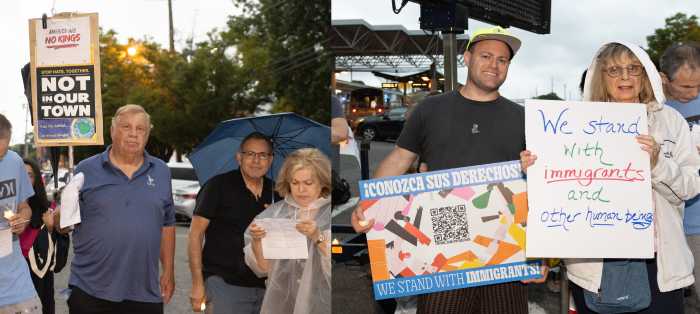On Aug. 12 the Levittown Public School District’s Board of Education held one of its regular meetings at the Levittown Memorial Education Center.
The meeting was called to order by Dan Bornstein, who currently serves as board president. Bornstein succeeded to that position following the recent resignation of the previous president, Gina Interdonato. Interdonato still remains on the board as one of the trustees, while former Board Secretary Michael Pappas now serves in Bornstein’s former role as vice president.
Interdonato’s was one of two resignations that comprised a major shakeup of the board over the past two months. The other was the resignation of Dr. Herman A. Sirois, superintendent of schools, effective June 30, 2011. Sirois has served as the district’s superintendent for more than two decades, one of the longest tenures of any superintendent on Long Island. His resignation was accepted by the board at the July 7 meeting.
The resignations of Interdonato and Sirois and the reconfiguration of the board come on the heels of several controversies that have dogged the board this year. The first of these was the board’s professed intention to implement cutbacks among the district’s programs and services in order to achieve a desirable budget for the upcoming fiscal year. Although this drew the ire of many district residents and resulted in often rowdy protests at board meetings, the board was ultimately able to minimize the severity of these cuts. However, a voter-approved referendum (Proposition #2) that would reduce bus services to district children – saving the district an estimated $800,000 a year – angered many other residents and led to further hostilities at meetings. In addition, the board has received widespread criticism for the recently-released results of a state audit that outlined a number of past improper budgeting practices by the district.
Dr. Sirois began the Aug. 12 meeting by addressing the findings of the state audit as well as questions and concerns raised by some district residents. He pointed out a number of mistakes and miscalculations he claimed the auditors had made. He justified the district’s propensity for allocating money to reserve funds, a practice the audit had criticized, by explaining that it was necessary in order to spare district taxpayers from having to suffer what he called “the trauma of tax spikes” – “tax spikes” being sharp and sudden increases (as much as 20 percent or more) in tax levies. According to Dr. Sirois, the excess money stored in these allegedly “overfunded” reserves was later put toward reducing subsequent tax levy increases. As a result, he explained, the district has been able to raise taxes only gradually and predictably over the last several years and has avoided the kind of tax spikes that have infuriated taxpayers in other districts.
Dr. Sirois also noted, “While the state audit objected to several of our practices, no one disagreed with the wisdom of them, and in fact the state allows itself all of these strategies.” While he acknowledged that Levittown taxpayers still pay among the highest school tax rates on Long Island, he also produced statistics that showed that the current Levittown tax rates no longer rank as highly compared to other island districts.
Following Dr. Sirois’ comments, the Public Be Heard segment of the meeting got underway. This granted audience members who had signed up in advance opportunities to address the board. This particular Public Be Heard, owing to the smaller number of speakers, was significantly shorter and less chaotic than those of other meetings this year. Even so, it still featured the almost obligatory moments of unruliness.
Once again, continuing a trend that began in May, the most prevalent issue raised by speakers was in regard to the busing referendum.
“Our busing situation is horrendous!” one woman declared. “I fought for three years to get a bus stop closer than three blocks away to my house, and finally got it mid-year last year; and now this year, our buses get taken away completely!” She also criticized Dr. Sirois for focusing his earlier speech on district finances rather than what she insisted was the more pertinent issue of student safety, telling him, “I think that the safety of our children should be much more important than where you’re shifting around the money.”
Speakers complained that putting more children in the position of having to walk to school and from longer distances would unnecessarily expose them to a variety of potential dangers, including the high-traffic roads that they would have to cross and the homes of registered sex-offenders that they would have to pass.
“This board is changing our school district into a pedophiles’ hunting ground,” one man sniped. “If something happens to my child, I will hold this board personally responsible – as should the parents of every child in this district.”
Several speakers reiterated a complaint made at prior meetings that the wording of the proposition on the voting ballot was confusingly and deceptively worded, potentially misleading many voters into voting in favor of the proposition when their actual intention was to vote against it. Those speakers pointed out that the Lindenhurst School District’s residents had lodged a similar complaint in regard to the wording of a busing referendum that had been included in that district’s recent budget vote, and the district’s board had responded by arranging a special re-vote on the matter – which, incidentally, had been held earlier in the same day as this very meeting. (Editor’s Note: That re-vote failed to overturn the referendum.) Although Dr. Sirois acknowledged that the wording of the Levittown proposal was indeed confusing and was in fact very much similar to that of the controversial Lindenhurst proposal, he explained that the wording had to meet certain criteria established by New York State law and thus could not be worded any differently. The board, which had already received a petition to arrange a re-vote on the referendum and had voted against the measure, gave no indication that it would reconsider its decision not to hold a re-vote.
One speaker complained that the very premise of the referendum vote was unfair and discriminatory, as the number of students and parents that would be affected by the referendum are far outweighed by those who would not be. Thus, she argued, the fates of those who need the additional busing are inevitably going to be left in the hands of those who do not.
At one point, the discussion of the busing referendum erupted into a frenzied war of words between one woman in the audience and the board, leading President Bornstein to bang his gavel on the table in front of him in an effort to restore order and even threaten to abruptly adjourn the entire meeting. Ultimately, Bornstein chose to ignore the woman and proceed to discuss other matters while the woman continued to berate him and the other board members. Eventually, the woman stormed out of the room in disgust.
In addition to the busing situation, other issues that were raised by speakers included the reductions in summer school programs that were made as part of the board’s recent cost-saving measures.
“I think that if we can continue with honors courses, if we can continue with AP courses, if we can give all the extras, we definitely should be giving summer school,” said one woman. “Supposedly it’s $200,000 to run summer school. If we can spend that much at least on honors courses and AP courses, we should be able to give our kids the minimum education that they deserve.”
Another woman criticized the board for its decision to retain bowling as part of the district’s curriculum at the price of having to make cuts elsewhere. Bowling costs the district roughly $30,000 a year to secure the use of local bowling alleys.
“Why should we spend $30,000 on something we don’t need?” the woman inquired.
Interdonato responded by stating simply that the board had resolved itself not to alter district curriculums as part of its cost-cutting efforts and was steadfastly bound to that principle.
Following the Public Be Heard and the subsequent discussion, the board voted to undertake a private executive session to review its remaining agenda for the evening. The public session was reconvened roughly an hour later, and the board proceeded to conduct its new business in a notably swift and orderly fashion.
The most significant item discussed was the setting of the tax levy for the 2009/10 fiscal year. The board had originally proposed a tax levy of $118,611,521, which would feature a 3.95 percent increase from the previous year’s levy, to finance $183,182,412 in expenditures. However, given that the busing referendum is expected to reduce expenditures by roughly $800,000, the board now mulled over the option of reducing the tax levy by as much as the same amount. Dr. Sirois initially expressed concern over reducing the levy by the entire amount, suggesting that it might be more prudent to keep some of the tax revenue in reserve and put it toward reducing the following year’s levy. However, Vice President Pappas argued that no sum less than the full $800,000 should be reduced from this year’s levy.
“Whoever voted for that proposition voted with the premise that $800,000 [would be] coming off and bringing that down to 3.25 percent,” he said. “They didn’t vote for $600, $500, or $100 [thousand], they voted for $800,000. That has to go back to the taxpayer.”
The audience concurred, with members yelling out “That’s right!” as Pappas spoke, followed by a round of applause from the entire assembly after he had finished. The rest of the board quickly followed suit and adopted the same viewpoint, ceasing any further discussion on the matter. The board voted unanimously, 7-0, to reduce the tax levy by the entire $800,000. As a result, the proposed 3.95 percent tax increase will be reduced to 3.25 percent.
Among the other items that were discussed were the approval or rejection of various bids, the appointment of a new school physician, and the discarding or donation of obsolete textbooks, vehicles, and equipment currently used by the district. In addition, the board voted to appoint trustee James P. Ward as its new representative to the Levittown Teachers’ Center Policy Board. A moment of silence was also given on behalf of Richard Insalaco, a teacher aide at MacArthur High School who had recently passed away.

































